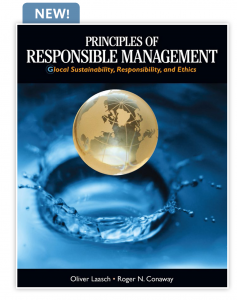Preview Textbook: “Principles of Responsible Management”
After five years of work from idea to publication, the first United Nations Principles for Responsible Management Education (PRME) textbook, “Principles of Responsible Management: Glocal Sustainability, Responsibility, Ethics” will be published through Cengage end of 2013. The book, lead-authored by Oliver Laasch and Roger N. Conaway, answers the urgent need for an applied and comprehensive textbook for responsible management education. The book is designed to be a main textbook for sustainability, responsibility, and ethics courses at business schools. Different from most existing textbooks which take an organization-centered perspective, “Principles of Responsible Management” pursues a manager-centered approach and covers the management of sustainability, responsibility, and ethics throughout the main areas of business, from strategy to finance.
Features
The book´s first section explores the context of responsible management in two chapters and subsequently delves into the theory of sustainability, responsibility, and ethics in the next three chapters. The book’s second section takes a closer look at primary management functions, including strategic management, entrepreneurship, organization, operations, supply chain management, human resources, marketing and communication, international business, accounting, and financial management. Each topic is addressed in a complete chapter and provides concepts and tools which apply sustainability, responsibility, and ethics in their respective management functions. Important didactical design features of chapters include:
- An integrated blend of outstanding “mainstream” management and responsible management concepts
- An “word cloud” summary and end-of-chapter review questions
- An introductory case and in-practice boxes written by international educators and practitioners
- A practitioner interview and a topic-pioneer dialogue about the chapter topic
- Complete power point presentation sets, instructor manual, and test bank
Contributors
The writing process in this publication was highly collaborative with over 50 contributors as chapter authors, case and box contributors, and interviewees. The book includes exclusive interviews with topic pioneers, such as Edward Freeman, Philip Kotler, John Elkington, Geert Hofstede, Robert Costanza, Björn Stigson, Simon Zadek, Sandra Waddock, Michael Braungart, Mark Kramer, Linda Treviño, Jonas Härtle, and Liz Maw. While two thirds of the total textbook chapters have been written by the primary authors, other outstanding specialized educators authored the following chapters:
- Accounting and Controlling, Ulpiana Kocollari (University of Modena)
- Entrepreneurship, Rory Ridley-Duff (Sheffield Hallam University), Mike Bull (Manchester Metropolitan University)
- Operations Management, Rick Edgeman (Aarhus University), Zhaohui Wu (Oregon State University)
- Supply Chain Management, Zhaohui Wu (Oregon State University), Rick Edgeman (Aarhus University)
- Human Resources Management, Elaine Cohen (Beyond Business)
- Financial Management, Nick Tolhurst (Steinbeis University Berlin)
Nick Tolhurst, author of many landmark publications in CSR, has been a driving force in the conceptual design of the book and in assuring pioneer interviews with outstanding individuals.
Adoption
The book´s primary use is as a required textbook for business sustainability, responsibility, and ethics courses, as offered by many business schools. Secondly, business degree programs will find the book´s chapters on mainstream business functions, such as strategic management, accounting, and human resources, to provide valuable contents for a coverage of sustainability, responsibility, and ethics across the curriculum. Chapters will be available to be bought individually. A third possibility is to use the book as primary text for first year courses, such as “Introduction to Management”, as each chapter´s responsible management contents are structured around the logic of mainstream management concepts.
Even before its official publication, the book has been well received. Five out of six reviewers stated they were very likely to adopt the book. Positive points they highlighted were the conceptual rigor, practical application, and strong chapter structure. Several dozens of academic institutions have made firm commitments to use “Principles of Responsible Management Education” for their sustainable leadership, business ethics, and business and society courses. Educators interested in adopting the book are welcome to get in touch with the lead author and CRME founder Oliver Laasch, to discuss strategies for adoption of the book or to receive ancillary materials. The book will be pilot-tested in courses around the globe before its official launch.
For a more extensive description, please check the book outline available on the UN PRME homepage as part of the call for contribution or through major book retailers, such as Amazon. To request inspection copies, please get in touch through the Cengage book homepage. For reviews of the book click here, for access and pricing options here.
Chapters and Structure
The book is organized into six big parts (A-F). The basics and domains sections (A and B) are designed to be a primer on responsible management. Parts C-F are structured into the four tasks of management, planning, organizing, leading and controlling. These parts aim to provide function-specific concepts, tools, and practice for the implementation of sustainability, responsibility, and ethics in the most important areas of business and management. Parts a and B (Chapters 1-5) and Parts C to F (Chapters 6-15) are designed so that they either may be split into two courses, or taught as one continuous course. Cross-references between chapters have been avoided so that single chapters could be used independently from the main book (can be acquired directly through Cengage) and so that they could flexibly be integrated into existing course materials.
PART A: BASICS
1) Context: Drivers, Actors, Subjects
2) Management: Basics and Processes
PART B: DOMAINS
3) Sustainability: Managing for the Triple Bottom Line
4) Responsibility: Managing for Stakeholder Value
5) Ethics: Managing for Moral Excellence
PART C: PLANNING
6) Strategy: Responsible Competitiveness
7) Entrepreneurship: Value-Added Ventures
PART D: ORGANIZING
8) Organization: Responsible Infrastructure
9) Operations: Responsible Enterprise Excellence
10) Supply Chain: Responsible Supply and Demand
PART E: LEADING
11) Human Resources: HR-RM Symbiosis
12) Marketing and Communication: Stakeholder Goodwill
13) International Business and Management: Glocally Responsible Business
PART F: CONTROLLING
14) Accounting and Controlling: Stakeholder Accountability
15) Finance: Responsible Return on Investment


0 Comments on “Preview Textbook: “Principles of Responsible Management””